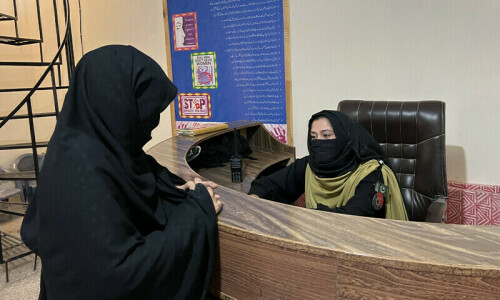PESHAWAR: The health department’s project to provide free treatment to poor cancer patients in partnership with private organisations has been receiving worldwide recognition, according to sources.
They said that the model of the project was likely to be replicated in the developing countries. Treatment of poor blood cancer patients started by the health department has benefited more than 2,100 people with 88 per cent survival rate at department of medical oncology at Hayatabad Medical Complex, Peshawar.
Prof Abid Jameel, head of the department, will make a presentation at Oxford University, UK on the model adopted by the health department for free treatment of cancer patients.
Model of project likely to be replicated in developing countries
“There has been a heated debate throughout the world about the expensive anti-cancer drugs, procedure and diagnosis. Research is being conducted to look into ways and means to ensure treatment of the patients, who cannot afford high cost of medication,” Prof Abid told Dawn.
“We would be making a presentation at Oxford University, UK on September 9 wherein the model we designed and implemented would be shared with the participants,” he said.
Prof Abid said that health department started the project under the public-private partnership programme with drug manufacturing firm Novartis in 2011 to enable the poor patients to seek treatment for blood cancer.
Under the initiative, the company spent 90 per cent and government spent 10 per cent of the total expenditure incurred on the treatment of the patients, he said.
“The drug manufacturers have been extending this facility to the governments as part of their corporate social responsibility to enable the people to get cure free of cost. The UK Cancer Care Commission has accepted the health department’s model to be presented at the conference for the benefits of other countries, especially the developing ones,” he said.
Prof Abid said that people had accessibility to expensive treatment of cancer due to insurance programmes and huge budgetary allocations for health sector but poor patients were dying of cancer for want of medicines.
He said that the model designed by health department of Khyber Pakhtunkhwa was later replicated in Sindh and Punjab provinces to ensure treatment of poor cancer patients.
“We have also started homework to replicate the same model in Gilgit-Baltistan where people have a lot of difficulties in treatment of the ailment,” he added.
Prof Abid said that currently people of Gilgit-Baltistan visited Peshawar and Islamabad to seek treatment for cancer.
“We have spent about Rs15 billion on the treatment of patients so far. In this, the government’s share was Rs1 billion while the rest came from the drug manufacturer with which we have signed a Memorandum of Understanding,” he added.
He said that recently agreements were signed with other pharmaceutical companies for provision of medicines at discounted rates. “One firm has agreed to a concession of 35 per cent and another to 70 per cent,” he added.
Published in Dawn, September 3rd, 2018











































